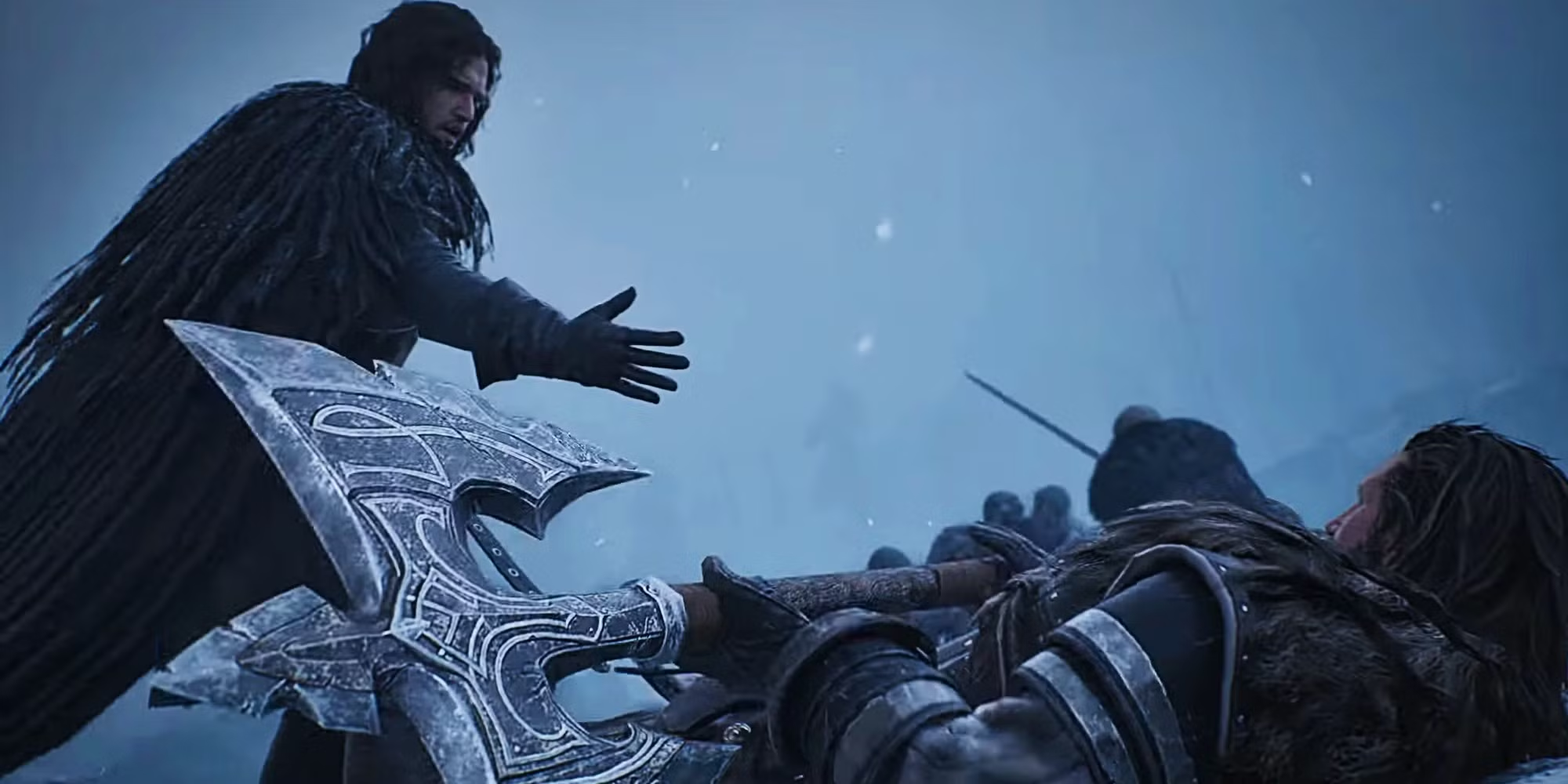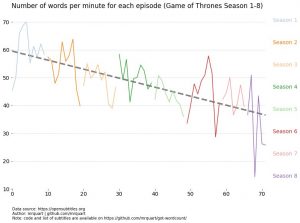Warning: This post contains spoilers for season 8 of Game of Thrones
Game of Thrones has dominated the entertainment scene since its premiere in 2011. Over the past eight years, the show has made waves thanks to its deft storytelling, exceptional special effects, and layered acting. Viewership kept growing up to the series finale, which had more than 19.3 million viewers across platforms. However, in recent seasons the spark which captured the imaginations of millions of fans in its early years began to die down. Season 8 was no exception and provided a disappointing end to the series.
Before season 8 even began, expectations were at an all time high. Season 7 was considered lackluster by fans and critics alike and there was a lot of pressure for Thrones to bounce back. Add in that viewers had to wait a year and a half to see their favorite characters grace the screen, and you have a recipe for disappointment. Yet, fans still held out hope that showrunners David Benioff and D.B. Weiss could turn things around.
The season begins in the North with Daenerys Targaryen (Emilia Clarke) and Jon Snow (Kit Harington) returning to Winterfell to prepare to fight the Army of the Dead and their leader, the Night King (Vladimír Furdík). Jon learns a secret that viewers have known since the end of last season: Jon is a Targaryen—son of Rhaegar Targaryen and Lyanna Stark—throwing his romantic relationship with Daenerys into question. In King’s Landing, Queen Cersei (Lena Headey) has reneged on her commitment of troops to the North and her wacko pirate boyfriend Euron Greyjoy (Pilou Asbæk) has supplied her with the Iron Fleet. Finally, Jaime Lannister (Nikolaj Coster-Waldau) arrives at Winterfell after leaving his sister behind, only to see Bran Stark (Isaac Hempstead Wright) for the first time since he pushed the then-child out of a tower window in the first season. After the premiere episode, the show had a perfect setup for the season. Time would prove that they could not deliver.
Recaps of the episodes cannot give due justice to the disappointment each one brought with it, but this wasn’t exactly a surprise. The show had actually been going downhill long before this season began. It really started when the show moved past book series author George R.R. Martin’s work in season 6. In season 8, Benioff and Weiss seemingly lost control of the characters they were tasked with preparing for television, a problem exacerbated by the fact that character interactions and motivations were cut in order to pack the final season into six episodes of television, a creative choice made by the showrunners who were trying to wrap the story as quickly as possible. At the end of the day, narrative flow was sacrificed in favor of pure spectacle.
Pacing was a large issue, as the plot moved at supersonic speeds. The third episode of the season was home to the largest battle in television history. Characters such as Beric Dondarrion (Richard Dormer) and Jorah Mormont (Iain Glen) fall in battle against the Army of the Dead. Jon and his comrades fight valiantly but seem powerless to stop the Night King in his pursuit to destroy Bran, now known as the Three-Eyed Raven. Just as the Night King is about to kill Bran, Arya Stark (Maisie Williams) leaps out of nowhere and is caught by the Night King, but pulls a move with her dagger to kill him and end the White Walker threat which was so slick that myself and Voice Halftime sports editor Nathan Chen could not stop holding each other for five minutes afterwards. However, the epic events in this episode were soon brushed aside with little consequence. From the very first scene of the series, the White Walkers were billed as the final conflict, the culmination of the entire series. Unfortunately, they became victims of the show’s fixation on the titular “game of thrones”, and were dealt with in a swift manner. They were never given proper motivation and the emotional stakes of the series were saved for King’s Landing.
The show’s fast pacing also forced viewers to fill in gaps as to why characters performed certain actions, instead of an in-show explanation. This leads to confusion when characters make seemingly split-second decisions that make no sense to loyal viewers.
This was first exemplified with Jaime Lannister, who, despite all the character development he had undergone over seven seasons, left his new life with Brienne (Gwendoline Christie) and ran back to Cersei for no apparently good reason. Jaime’s redemption arc was broken in an instant and left viewers wondering what all his growth had been for. As was revealed in the bath scene in season 3, Jaime was more than his legacy as a Kingslayer, and his leaving Cersei in the season 7 finale proved he was more than a Lannister. This was all left behind, and the viewer did not even get to see scenes of his decision making process. One minute he was in bed with Brienne, the next he was off to be with the woman who just sent Bronn (Jerome Flynn) to kill him.
In addition to Jaime’s, episode 4 is teeming with poor character decisions. Jon shares the secret of his Targaryen ancestry with Arya and Sansa (Sophie Turner) out of a sense of duty, which backfires when Sansa immediately tells Tyrion (Peter Dinklage). Daenerys makes several tactical errors, including refusing Sansa Stark’s counsel that their soldiers need rest, losing her dragon, Rhaegal to the Iron Fleet, and sitting helplessly while watching Missandei (Nathalie Emmanuel) die during negotiations with Cersei.
The penultimate episode would be the most cause for controversy yet, mostly due to those aforementioned mistakes. After forcing the Lannister army to surrender, Daenerys descends fully into madness, partially due to her Targaryen blood lines, as well as the horrors she has had to face. This leads to Daenerys, atop Drogon, completely razing King’s Landing, killing Cersei and Jaime, as well as thousands of innocent civilians.
If there is one aspect of Game of Thrones that never declined, it was the special effects and cinematography. Most of the episodes, with the exception of the near darkness of episode 3, were beautifully shot and the CGI proved to be second to none. While scorn was deservedly given to the show for accidental coffee cups and water bottles, the demolition of King’s Landing was stunning and the visual of Drogon unfolding his wings behind Daenerys in the finale may be the most amazing the show has ever done.
Unfortunately, these visual effects could not overcome the shoddy writing that encumbered this season. Jaime was not the only character who saw themselves bastardized in the final season. Brienne, the pinnacle of strength as a woman in this show, was left pining after Jaime—literally sobbing. Tyrion and Varys (Conleth Hill), once two of the smartest and savviest men in the realms, lost all ability to strategize or stick up for themselves. Varys is killed making an open power play, after seasons of work in the shadows, and Tyrion loses all control over Daenerys and is powerless to affect her decisions.
For years, Game of Thrones’ strength was its dialogue. As seen in the chart to the right, this dialogue has been decreasing dramatically as the seasons have gone on. While this is not necessarily an issue, as action has rightfully taken the center stage, the real problem is the depreciation in the dialogue’s quality, which started when Martin’s source material ran out. The writers changed the focus of conversations, making them less part of the story in their own right, and more of a way to move the story along from Point A to Point B. The writers also began shoehorning in the comedy and drama, something which had once come naturally. The first pieces of dialogue in the season involved Tyrion and Varys, two characters known for their sharp wits, yet the conversation simply became a forced eunuch joke, and things did not improve from there.
The poor characterization that rises above all else lies with Daenerys Targaryen. For years, Daenerys was known as a liberator, someone who wanted to “break the wheel,” someone who was always thinking about her goal to ascend the Iron Throne. So much of this went out the window. First, she lost all battle sense, despite leading armies for years. She refused to heed Sansa’s advice about her tired army and lost Rhaegal after she “kind of for forgot about the Iron Fleet,” according to Benioff, which may say less about Daenerys and more about the showrunners overlooking logic in order to move the plot.
These mistakes pale in comparison with Daenerys’ Mad Queen arc, where she becomes like her father, the Mad King, and loses her mind, leading to mass destruction. The problem is not with the concept. This had been foreshadowed for a few seasons, and it is likely a plot point in George R.R. Martin’s final books. However, the show rushed the big reveal and cheapened a character that fans had grown to love over the years. She moved from liberator to mass murderer so quickly, and this was blamed on some rapid-fire tragedies (death of Missandei and Rhaegal, and then the potential rival of Jon Snow) and her genetics. This was a lazy cop-out that calls to mind the stereotype that women are too emotional to lead. To blame the murder of thousands on genetics and PTSD caused by the sound of bells ruins the character viewers thought they knew for years.
The show is at its best when it creates nuanced characters that operate in the gray area, and this season slipped too much into the category of black and white. In the final episode of the series, Jon Snow must grapple with his duty to his queen, as well as the good of the people. He has seen Daenerys’s catastrophic tendencies and ultimately decides to act, pulling his former love close and stabbing her. Drogon, in a senseless act of symbolism, burns down the Iron Throne before carrying Daenerys away, never to be seen again. This leads to the formation of a council of Westerosi leaders who meet at the Dragonpit and decide that Bran should be the new king. The show ends with Bran and his Small Council, including Tyrion as his hand, Bronn as Master of Coin, Davos (Liam Cunningham) as Master of Ships, Brienne as Captain of the Kingsguard, and Sam as Grand Maester. Elsewhere, Sansa is named Queen in the North, Arya leaves to find what is west of Westeros and Jon is sent to live out his days where this all began, with the Night’s Watch.
After eight years of impeccable storytelling and intricate character development, the show lost much of its subtlety. Cersei, the Night King, and, eventually, Daenerys were evil. Jon, Tyrion, and Arya were good. The good defeated evil, and most of our favorite characters survived. Martin once said that the end of his series would be “bittersweet.” This ending was almost saccharine. A concept that may have improved the season is a switch in arcs. Move Daenary’s razing of King’s Landing first, and then have the final war against the dead, with Daenerys playing a critical role in the Night King’s defeat. In this way, it would be very difficult to wrap the series with a tidy bow, just as Martin would have wanted.
Speaking of the end of the series, there are so many plot points that don’t make sense. First, Jon is “punished” by being sent to the Wall. A) This is no punishment, this is probably what Jon wanted all along. He can spend the rest of his days with his Direwolf Ghost and best friend Tormund (Kristofer Hivju). B) Why is there even a Night’s Watch at all? Wasn’t its purpose to stop the White Walkers? Were they not all extinguished? (If the Dothraki can somehow survive their suicide ride in the third episode, anyone can survive, I guess). In addition, The Azor Ahai prophecy that the show had been building for seasons turned out to be nothing, to say nothing about countless Night King theories that were extinguished.
This doesn’t even mention the fact that the Dragonpit Council scene is one of the most exasperating scenes this show has ever had. So much of it made no sense. There was Tyrion’s ability to speak at all, after losing all credibility throughout the season, to his reasoning for choosing Bran (because of his “story”? What?). Then there was Bran actually accepting the role despite his character’s aversion to the material world since he became the Three-Eyed Raven and began focusing on the past, present and future. Finally, there was the decision by Sansa and the North to secede, yet Yara Greyjoy (Gemma Whelan) and the new Prince of Dorne (Toby Osmond) sit idly by even though their kingdoms have always wanted independence. It did provide one of the funniest moments of the season, when the Council laughs off Sam’s concept of democracy, but it was still a letdown after years of wondering who would end on the Iron Throne.
Poor decision-making aside, the cast tried their best to elevate what they were given, and this led to some exceptional performances. The Lannister family actors had typically strong portrayals. In limited screen time, Headey delivered a vintage Cersei performance, Coster-Waldau sold Jamie’s heel turn, even if the writing didn’t support it, and Dinklage overcame Tyrion’s seemingly sudden onset of ineptitude to provide his strongest performance since season 4. The best piece of direction from the season was the lingering shots on the face of Arya during the burning of King’s Landing, as Maisie Williams’ expressions tell more of a story than most actors can do with their words. Finally, special credit must be given to Emilia Clarke, who was given the shaft by the writers due to the bastardization of her character, but saved her best performance for the last season. She sold Daenerys as a leader with a chip on her shoulder, as well as her descent into madness, even if it didn’t make narrative sense.
Unsurprisingly, the season did not go over well with the fans. Over 1.5 million people signed a change.org petition to “Remake Game of Thrones Season 8 with Competent Writers,” the last three episodes scored 5.6, 6.2, and 4.3 ratings on IMDb, respectively, and Twitter users did not mince words when proclaiming the final season to be a tragic disappointment. It could be argued this is overkill and the final season is being raked over the coals despite being perfectly OK. That’s the problem, though. A show like this cannot just have an OK ending. With a record 38 Emmys to its name, Game of Thrones was at the pinnacle of television. Unfortunately, the dramatic drop in quality over the last two seasons has left many fans with a bad taste in their mouth. It will be impossible to separate the stunning highs of the early seasons from the calamitous decline at the end. When reviewing Game of Thrones’ legacy, season 8 will go down as one of the weakest seasons of the show and provided an abject failure of an ending.




















![[Book Review] The Blade Itself (The First Law Trilogy) by Joe Abercrombie](https://bendthekneegot.com/wp-content/uploads/2018/01/1516047103_maxresdefault-218x150.jpg)



















